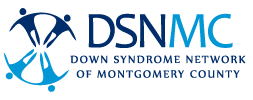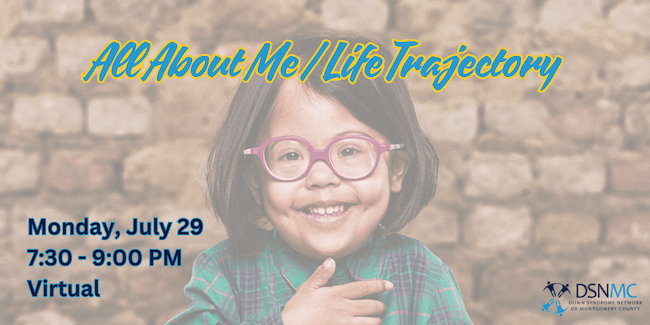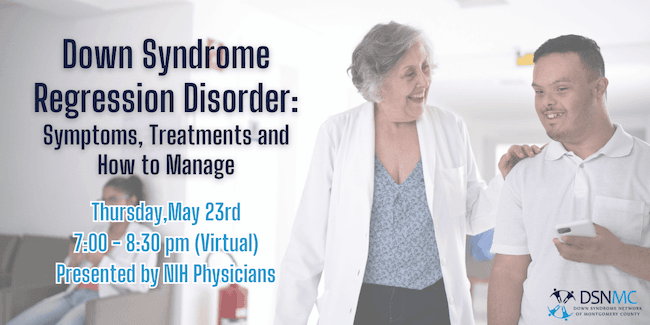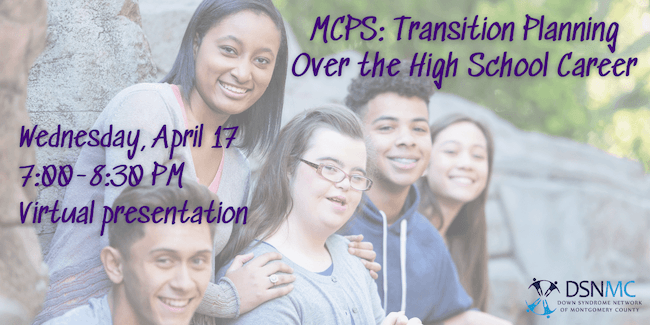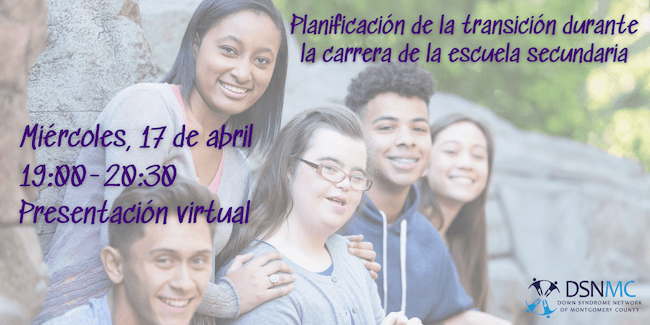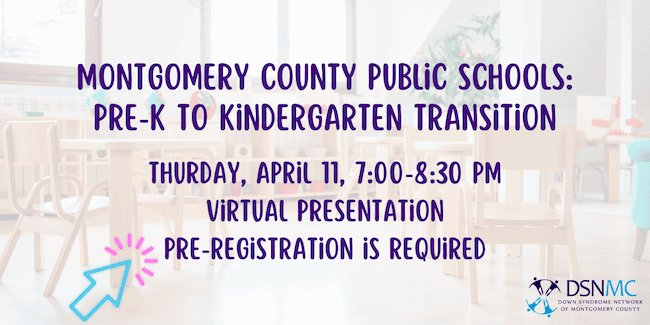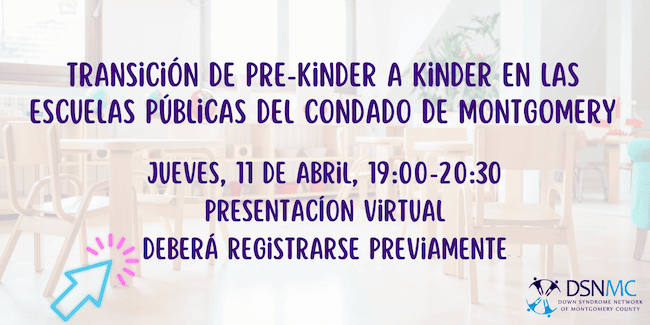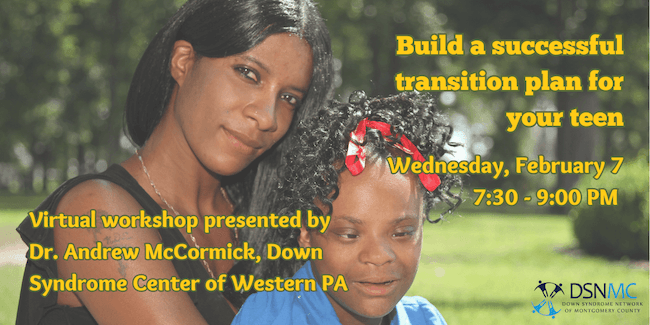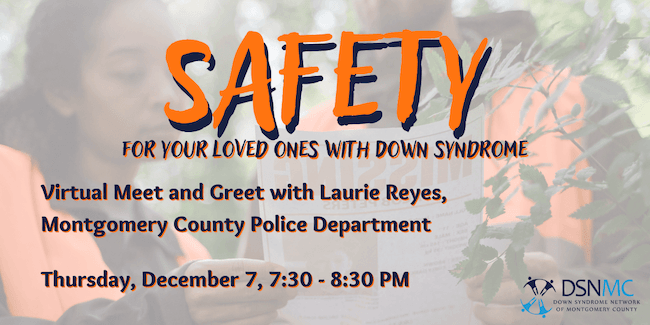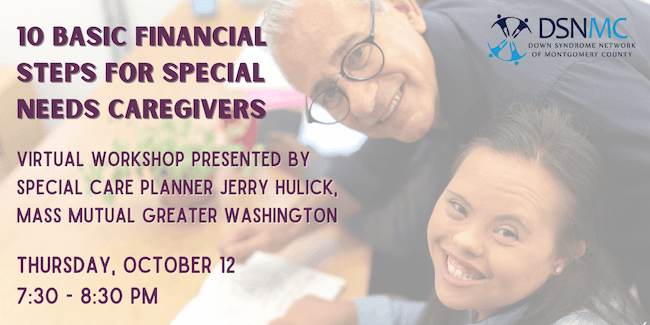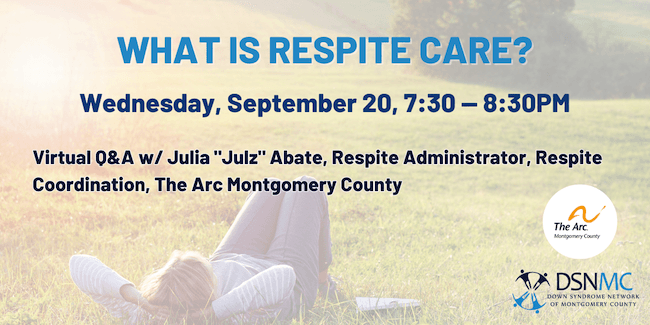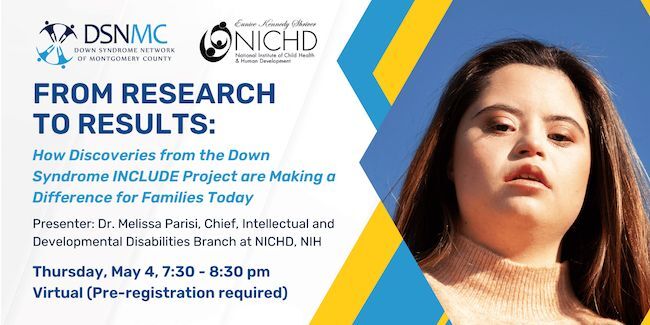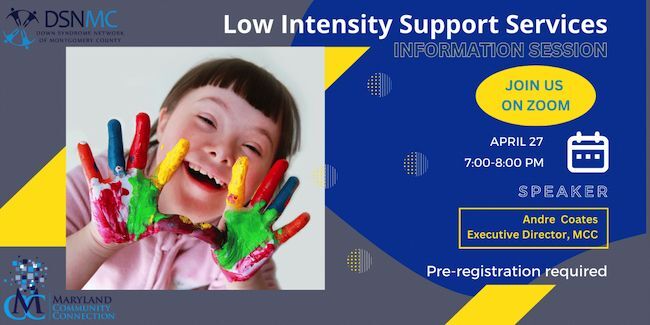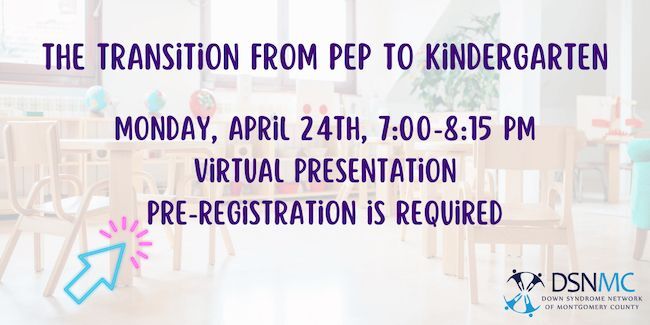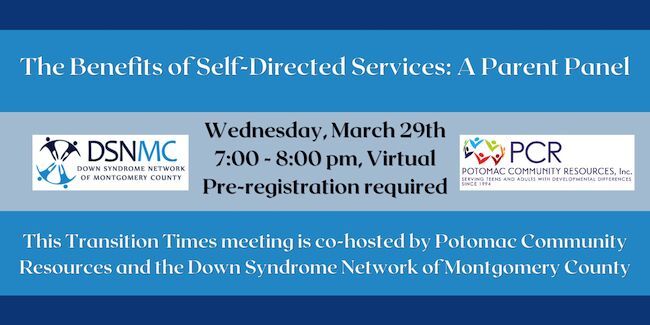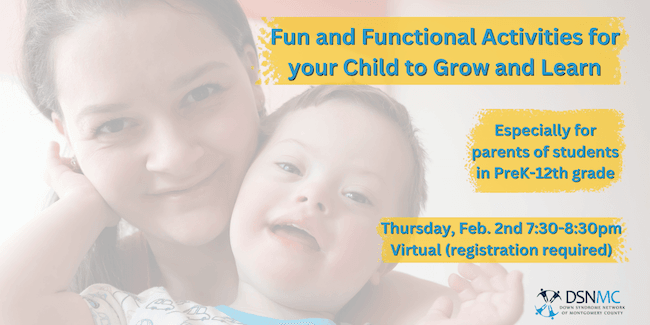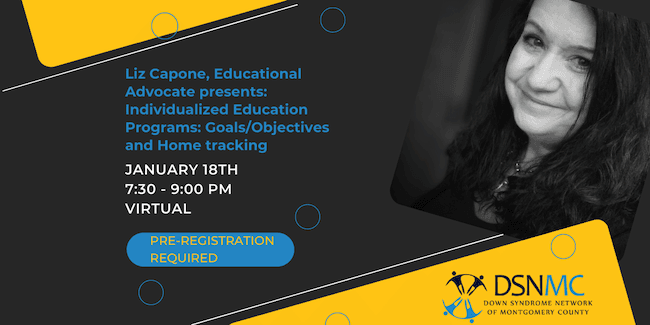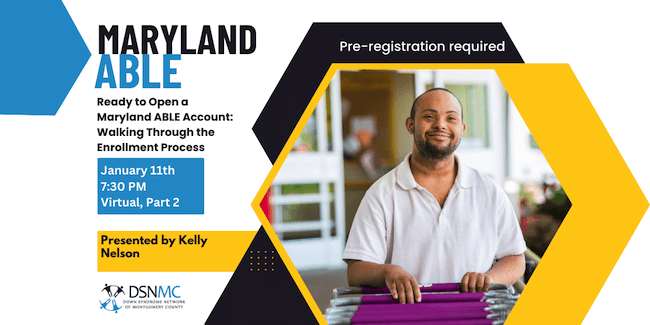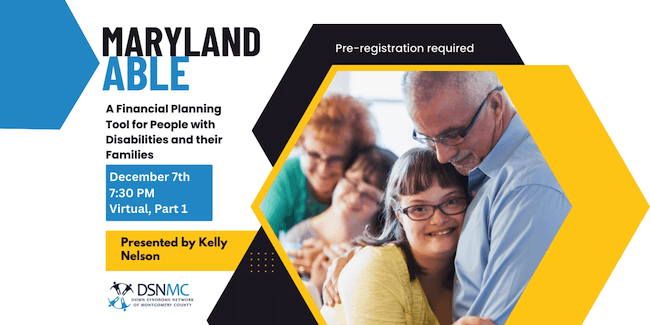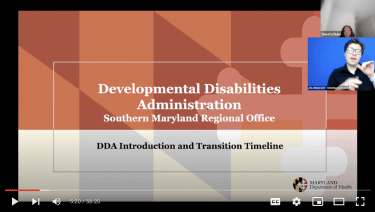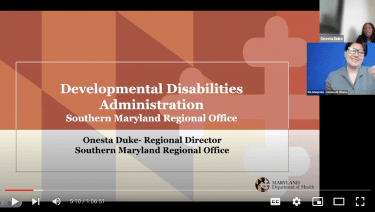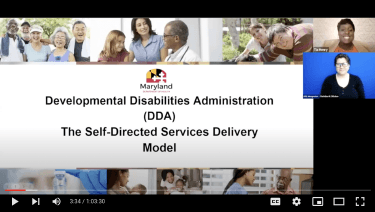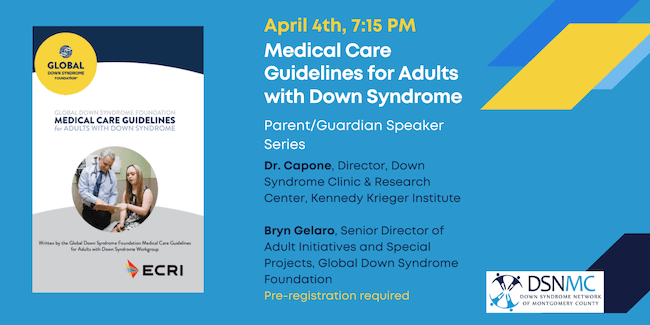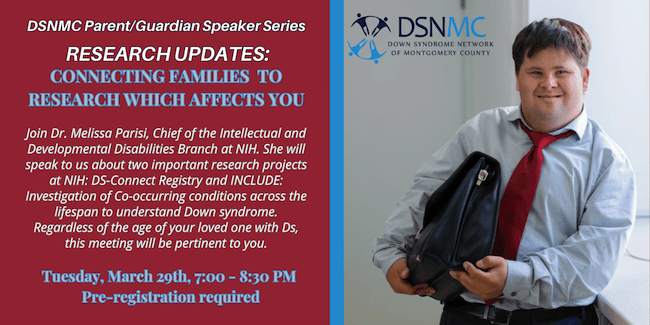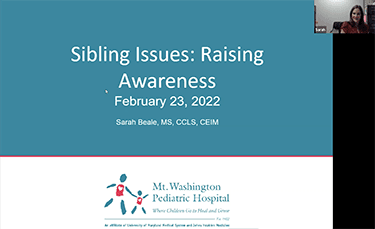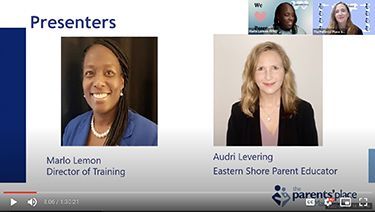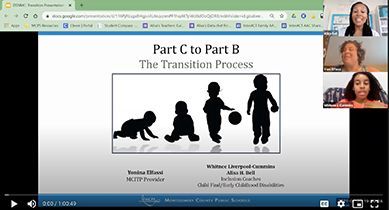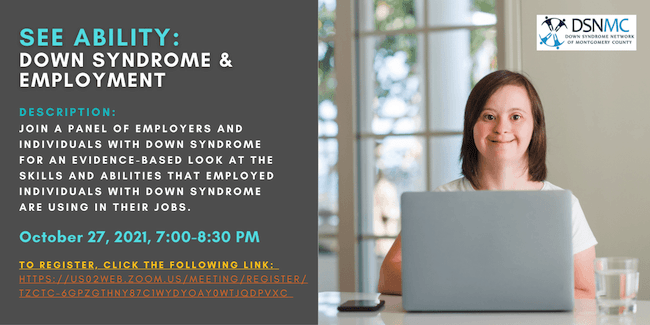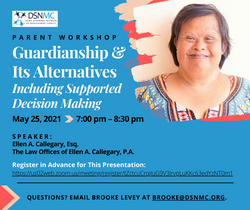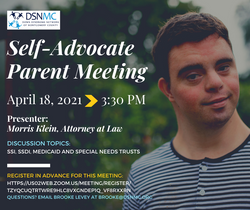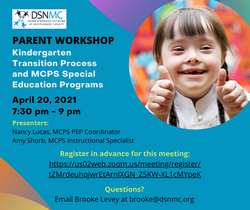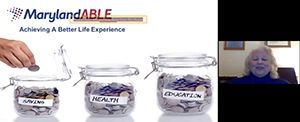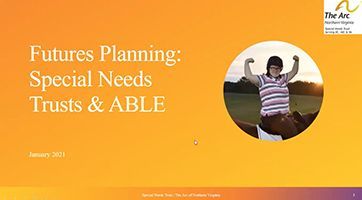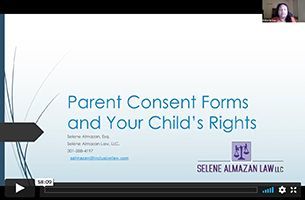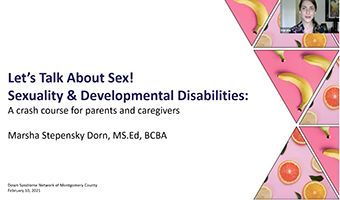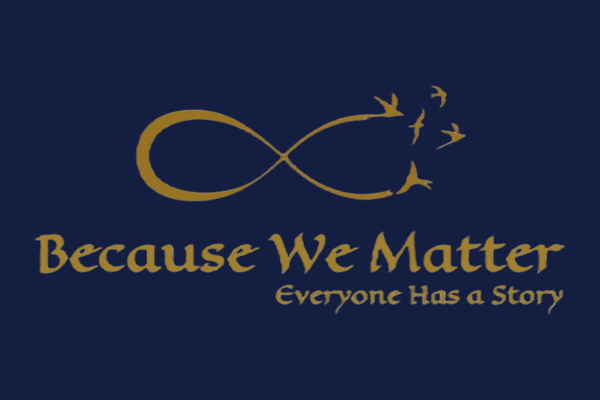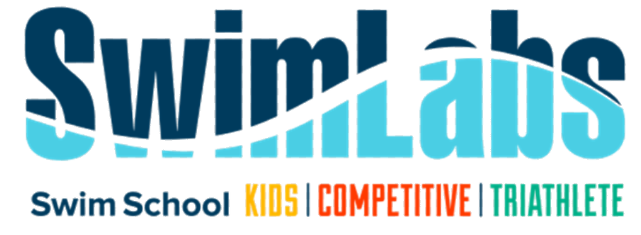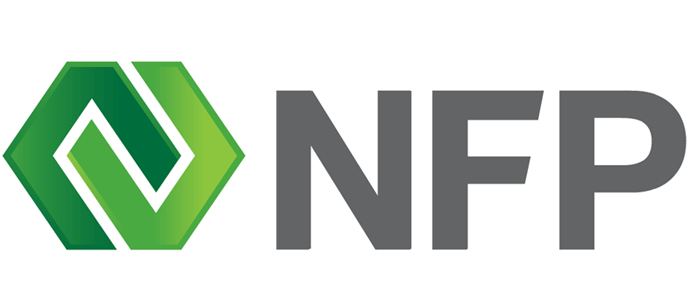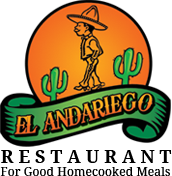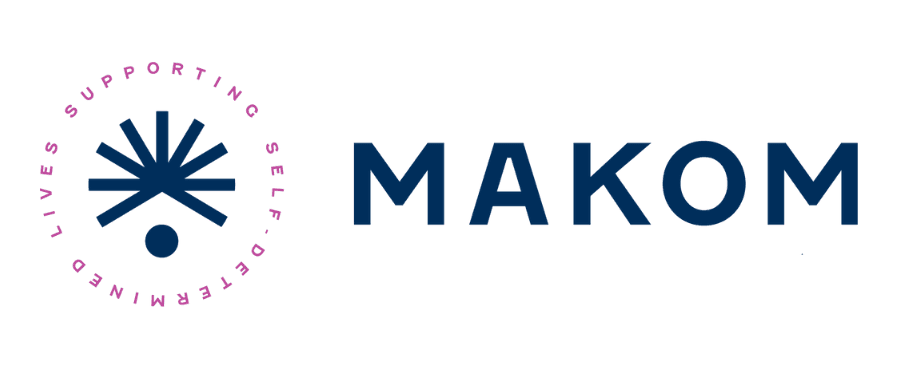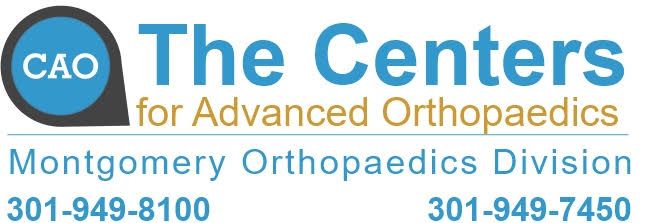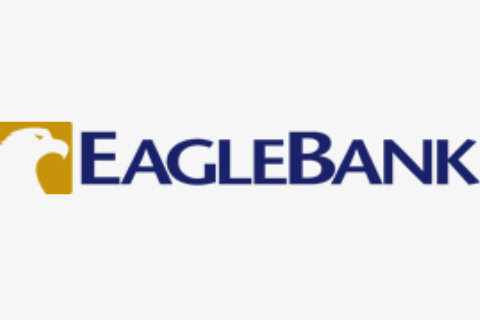Speaker Series Recordings
-
In this interactive discussion, DSNMC mom and advocate Kalani Brown and special education paraeducator, advocate, and mom of a child with IDD, Erin Rupolo, present on using Charting the LifeCourse to create a vision for your child. They also teach how to create an “All About Me” resource for school-aged kiddos to share as a one-page profile for special education and beyond.
-
Down Syndrome Regression Disorder (DSRD) is a rare condition affecting teens and young adults with DS that causes a rapid deterioration in their ability to function along with insomnia, catatonia, hallucinations, and new autistic features. This condition is severe but treatable. In this informative presentation, Dr. Laurie Ryan, PhD, and Dr. Jonathan Santoro, MD, delve into understanding DSRD, distinguishing it from other neurological conditions, and exploring available treatments. Learn how the National Institutes of Health INCLUDE Project is contributing to the acceleration of research advances in people with DS across the lifespan.
-
This workshop is a "must" for anyone who has a child in high school; parents of middle schoolers may also benefit. MCPS staff provide information regarding transition services, Community and Career Connections (CCC), Transition Training for Independence (TTI), MCPS career readiness opportunities, post secondary options, DDA and DORS.
-
Este taller es “imprescindible” para todo aquel que tenga un hijo en la secundaria; Los padres de estudiantes de secundaria son bienvenidos a asistir. El personal de MCPS brindará información sobre los servicios de transición, conexiones comunitarias y profesionales (CCC), capacitación de transición para la independencia (TTI), oportunidades de preparación profesional de MCPS, opciones postsecundarias, DDA y DORS.
* Para interpretación en español, seleccione "Español" en la configuración de audio.
-
Is your child getting ready to transition to Kindergarten? In this workshop, you will learn about the transition process, kindergarten instruction and schedules, the different educational services provided in MCPS, school assignments, transportation, and more! This presentation is designed for all parents with children transitioning to kindergarten and parents with children 0-3 who want to learn more about the early transition process.
-
¿Su hijo se está preparando para la transición al jardín de infantes? En este taller, aprenderá sobre el proceso de transición, la instrucción y los horarios del jardín de infantes, los diferentes servicios educativos brindados en MCPS, las tareas escolares, el transporte y más. Este presentación está diseñado para todos los padres con niños en transición al jardín de infantes y padres con niños de 0 a 3 años que desean aprender más sobre el proceso de transición temprana.
* Para interpretación en español, seleccione "Español" en la configuración de audio.
-
Dr. Andrew McCormick of the Down Syndrome Center of Western PA joined us for this informative workshop that will help you pave a healthy pathway to adulthood for your teen with Down syndrome. Topics include the use of age-appropriate checklists to guide us through the transition process, developing independence through the use of readiness assessments and goal development, and understanding power of attorney, guardianship, ABLE Act, and waivers.
-
Keeping our loved ones with Down syndrome safe is a priority for all families. In this virtual Meet and Greet, Officers Laurie Reyes and Amy Stoughton of the Montgomery County Police Department provide important tips on general safety and the prevention of wandering. This presentation is geared to families of all ages.
-
This workshop, presented by Special Care Planner Jerry Hulick, dives into some of the important issues and considerations for special needs caregivers. Topics include: government benefits, beneficiary designations, Special Needs Trusts, Guardianship and alternatives, the Letter of Intent, communication, and most of all how to begin the planning process. Families with loved ones with developmental disabilities face numerous unique legal and financial challenges. Although these issues are complex, and many times exhausting, having a clear understanding of the issues to consider will help you to develop a secure plan for the future to ensure the best quality of life for your loved one with Down syndrome, and for your family.
-
What is respite care? Is your loved one eligible? How do you find a respite care provider? How much does respite care cost? Learn the answers to these questions and more from this virtual Q&A with Julia "Julz" Abate of The Arc Montgomery County.
-
On May 4, we learned about the groundbreaking research that’s changing the lives of individuals with Down syndrome from a leading expert in the field. Dr. Melissa Parisi, Chief of the Intellectual and Developmental Disabilities Branch at the National Institute of Child Health and Human Development, NIH, shared the latest discoveries from the INCLUDE Project, which began in 2018. She discussed exciting new findings related to sleep apnea, regression treatments, and approaches for monitoring and potentially reducing the risk for adults with Down syndrome to develop Alzheimer’s disease. She also discussed the DS-Connect® registry, a valuable resource for families and one way that members of DSNMC can participate in research opportunities of interest to them.
-
Did you know that your loved one may be eligible for LISS funding? Ms. Andre Coates, Executive Director of Maryland Community Connections, joined us on April 27th to discuss the LISS application and eligibility process. LISS funding helps families receive support quickly without going through the entire DDA eligibility process. Families need to verify developmental disability as well as proof of Maryland residency. Services that LISS may cover include respite and child care, purchase of assistive devices, adaptive equipment, camp, and uninsured medical expenses. If you have been wondering what LISS funding is, if your loved one is eligible, or how to apply, you will benefit from this important presentation.
-
On April 24th, MCPS PEP Parent Educators joined DSNMC to discuss the transition from special education preschool programs to kindergarten. Presenters Sharon M. Hedgepeth, Katheryn A. Mathes, and Anne Marie Tagliaferri share about available kindergarten options for students with I/DD and other developmental delays. Parents of children involved with the Infants and Toddlers Program may find this information especially helpful.
-
In this parent discussion panel co-hosted by Potomac Community Resources and DSNMC, learn about families' experiences with DDA Self-Directed Services, public and private support used for their loved ones, challenges families have faced with the DDA system, strategies used to support their loved ones, and networking with other parents.
-
Ashley Lon, M.S., OTR/L, pediatric occupational therapist and Denise Bryant, M.A., CCC-SLP, ATP, pediatric speech-language pathologist from The Treatment and Learning Centers (Rockville, MD) present on how occupational and speech-language therapy skills can both be addressed using play, self-care routines, sensorimotor activities, and social participation. Presenters review the sensorimotor and communication characteristics of children with Down syndrome and provide a framework for developing their skills, and provide examples of activities that can be successfully implemented in the home setting. This presentation is geared toward parents with children in preschool, elementary, middle and high school.
-
Let’s delve into the nuts and bolts of IEP goals and objectives and learn more about the importance of having a proactive approach to collecting data at home. Educational Advocate and former special educator Liz Capone offers tips on synthesizing information from classwork, collecting information from homework observations, and using information from your child’s preferences and out-of-school activities. Give your child credit for their unique gifts, and include that data in the IEP.
-
Kelly Nelson from Maryland ABLE provides a step-by-step overview of the Maryland ABLE enrollment process. This presentation is intended for those who are already familiar with the eligibility criteria, benefits and features of an ABLE account and are ready to enroll (See Kelly's overview of Maryland ABLE accounts at https://vimeo.com/786627844). The presentation includes sample enrollment screens and a Q&A.
-
Kelly Nelson from Maryland ABLE shares an overview of how ABLE accounts can help people with disabilities and their families to save and invest for the future without jeopardizing federal, state, and local benefits such as SSI and Medicaid. Families will learn about the eligibility criteria, enrollment process, features of a Maryland ABLE account and the account management process, tax-advantaged savings and investment options as well as how to use the ABLE account to pay for qualified disability-related expenses.
-
Presented by Onesta Dukes, DDA Southern MD Regional Director
Recording on YouTube -
DDA Resources/Information: 3 Part Webinar Series
Potomac Community Resources, Inc., the Down Syndrome Network of Montgomery County, and Developmental Disabilities Administration (DDA) (Southern Maryland Regional Office) produced the following April and May 2022 webinars to help families and DD professionals learn about the services and supports offered by DDA; the Transition Timeline; and how to apply for services.
-
Presented by Onesta Dukes, DDA Southern MD Regional Director
Recording on YouTube -
Presented by Tia Henry, Self-Directed Services Lead, Southern Maryland Regional Office, DDA
Recording on YouTube -
In this webinar, two authors of the first-of-kind GLOBAL Medical Care Guidelines for Adults with Down Syndrome will provide a deep dive into the 9 medical topics covered and what families need to know about the Global Guideline! Attendees will learn what went into creating the initial Global Guideline and what exciting updates they can expect soon, including brand new toolkits, additional language translations and a family-requested family-friendly version! In addition, the speakers will share what topics they hope to cover in the next Global Guideline update and more!
-
Featuring three speakers from the Eunice Kennedy Shriver National Institute of Child Health and Human Development (NICHD), National Institutes of Health (NIH):
● Dr. Melissa A. Parisi, chief of the Intellectual and Developmental Disabilities Branch
● Dr. Sujata Bardhan, Health Scientist Administrator and DS-Connect® Registry Coordinator
● Linda Garcia, Communications and Outreach Coordinator for the INCLUDE (INvestigation of Co-occurring conditions across the Lifespan to Understand Down syndromE) Project and DS-Connect® Registry -
English PowerPoint Slides
-
Volante Español
_______________ -
Presenter: Sara Beale, Clinical Child Life Specialist, Mt. Washington Pediatric Hospital
_______________ -
Presenters:
Marlo Lemon, The Parents' Place of MD, Director of Training
Audri Levering, The Parents' Place of MD, Parent Educator -
IEP 101 Basics, Slides and Resources, .pdf file
_______________ -
Presenters:
Alisa Bell & Whitnee Liverpool-Cummins:
Both are MCPS Special Education Teachers, PreK Inclusion CoachesYonina Elfassi, Special Education Teacher, Montgomery County Infants and Toddlers Program
_______________ -
Presenter: Ellen A. Callegary, Esq.
This Workshop Covered:
This presentation focused on legal and ethical considerations for health care decision making for vulnerable adults, including adults with cognitive impairments. Participants learned about the currently available alternatives to guardianship, such as advance health care directives, advance directives for mental health treatment, and surrogate decision making; when guardianship of the person, guardianship of the property, power of attorney, or other alternatives, are appropriate. -
PowerPoint Slides and Resources
_______________ -
Presenter: Attorney Morris Klein
To see his full bio, visit his website: https://www.morrisklein.com/
To view the slides from this seminar, click on the link above.
This seminar was not recorded.
_______________ -
Presenters: Nancy Lucas, MCPS PEP Coordinator and Amy Shorb, MCPS Instructional Specialist
-
Presenter: Bette Ann Mobley
Director of Maryland ABLEThis workshop covered:
• Overview of how ABLE accounts can help people with disabilities and their families to save and invest for the future without jeopardizing federal, state, and local benefits such as SSI and Medicaid.
• Families heard about tax-advantaged savings and investment options as well as how to use the ABLE account to pay for qualified disability-related expenses.
• Learn about the eligibility criteria, enrollment process, features of a Maryland ABLE account and the account management process. -
A Presentation by Tia Marsili
Director of Trusts at The Arc of Northern VirginiaMrs. Marsili walks us through the importance of planning for the future of our loved one with a disability, why trusts are important, describe different kinds of trusts, ABLE accounts, and other critical services and programs, and benefits that we should consider.
-
_______________
-
Presenter: Marsha Stepensky, M.S
Program Analyst, Children and Youth with Special Health Care Needs
Association of Maternal & Child Health ProgramsDuring this workshop, we:
• Discussed misconceptions surrounding sexuality and the importance of comprehensive sexuality education
• Learned about human sexual development and developmental disabilities
• Gained knowledge about specific topics included in a comprehensive sexuality education curriculum
• Shared tips and resources to help you and your child -
Tribute 21 Funds
Tribute 21 funds will in 2021 will be used to support virtual programming for youth and adults. This will include speaker fees, online registration, and presentation platforms. Possible programming topics include parent to parent support groups; IEP process; speech for kids with apraxia; MCPS and private school/program options; transitioning to middle school, high school, out of school; puberty and sexuality; Federal, State and local resources; educational advocacy; medical issues related to Ds; social thinking; Individual Distance Learning Plans; best practices for distance learning; inclusion during virtual learning; Alternative Learning Outcomes Vs. Diploma Track. Programming will be determined through a survey of our members.
